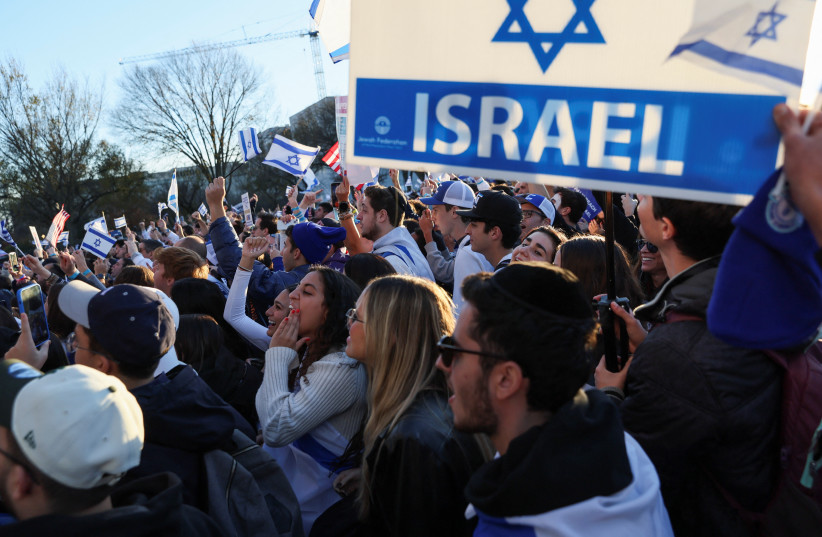In light of the Israel-Gaza war, several polls in the United States, including polls of the Jewish population, have shown that most Americans, including the majority of Jewish Americans, see themselves as “pro-Israel.” That should ordinarily be good news for Israel.
But one statement in the polling report of the Jewish Electorate Institute (JEI) should give pause when we consider what “pro-Israel” means.
“Younger Jews... express different views than others.”
What is the perspective of the younger generation of Jews?
While younger Jews still apparently identify as “pro-Israel,” they significantly differed in their attitudes from older Jews.
According to the JEI, this population showed less support in sending aircraft carriers to the region, less support for President Joe Biden’s visit to Israel, and more support for humanitarian pauses and a ceasefire; all arguably not consistent with a “pro-Israel” attitude.
In a survey I conducted after the JEI poll, I found results that are consistent with this attitude but also results that raise even more questions about what “pro-Israel” really means for younger Jewish Americans.

Before we look at those findings, let’s go back to a research project I conducted a few years ago on Jewish Americans. One of the conclusions was that Jewish Americans who define themselves as “liberal” are becoming more and more indistinguishable from other liberal Americans when it comes to attitudes toward Israel.
This trend is perhaps nowhere as pronounced as with the younger Jewish American population, something that more and more studies are finding. That trend may also show why support for Israel among Jewish Americans in the future, as the population ages, may be different from what we see now.
When I now asked over 200 Jewish Americans under the age of 40 if they consider themselves “pro-Israel,” over 65% agreed, consistent with what we would expect from other studies.
But this younger group does indeed differ from older Jewish Americans when it comes to Israel, insofar as about 35% also considered themselves to be “pro-Palestinian.”
Over 70% agreed that Hamas committed atrocities and war crimes, but a substantial over 40% also said that Israel was guilty of the same.
More than a quarter of the sample believed that Israel was engaged in “genocide” against the Palestinians. Over 12% said that Hamas should retain control over Gaza after the war and over 35% agreed with the statement that Hamas is a “resistance organization operating to further Palestinian national interests.” These findings all raise more questions than they answer.
PERHAPS THE most eyebrow-raising finding was the answer to the question, “If an election were held today in your district and a Democratic member of The Squad like Rashida Tlaib or Ilhan Omar were running against a moderate Republican, who would you vote for?”
This was a question asked in a previous study some years ago and, as in then, a large percentage, here about 42%, said they would vote for Tlaib or Omar. This is the same Tlaib who was censured by the House for her statements on the Israel-Gaza conflict, specifically her use of the “from the river to the sea” moniker, a term used by many who call for the ethnic cleansing of Jews from the area.
When so many in a clearly “pro-Israel” population believe that Israel is guilty of war crimes and genocide against the Palestinians; when so many young Jewish Americans are still willing to cast a vote for people like Tlaib and Omar, something is off-kilter.
But these types of findings are not so unusual anymore. More and more studies of Jewish Americans are showing a drift away from the traditional connection with Israel that was expected in previous generations. All this is despite Birthright trips, campus advocacy, despite Jewish education.
And as this segment of the Jewish population grows larger in the United States and as the trend continues, we can expect a more tempered and conditional relationship with the greater Jewish American community.
It seems that many young Jewish Americans are continuing on the same road that previous studies found; the road to merging attitudes with the non-Jewish liberal and progressive voices in the general population.
The majority are still supportive in the more traditional sense, but Jewish Americans need to ask how much longer this will be the case.
Marginal groups like “If Not Now” and “Jewish Voice for Peace” cannot be said to represent anywhere near most Jews in the United States, but as younger Jews look to define Jewish identity as an expression of a motif of social justice as interpreted by other progressive movements, Israel will play an increasingly marginal and eventual more alien and hostile role.
As with every war, an explosion of conflict brings an explosion of those lamenting Israeli public advocacy and it is true that there are many fires to put out around the world. But we would do well to look at our own backyard and figure out why the embers there are so hot and how to put them out before we look elsewhere.
The writer is a psychologist and senior fellow and researcher at the Jerusalem Center for Public Affairs.
